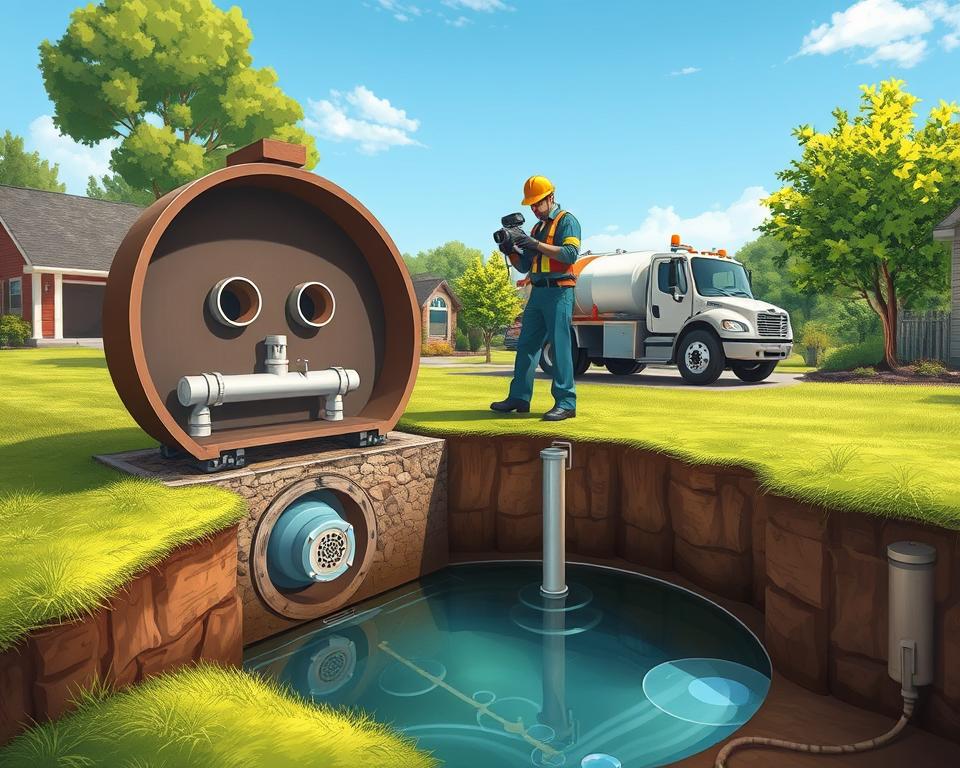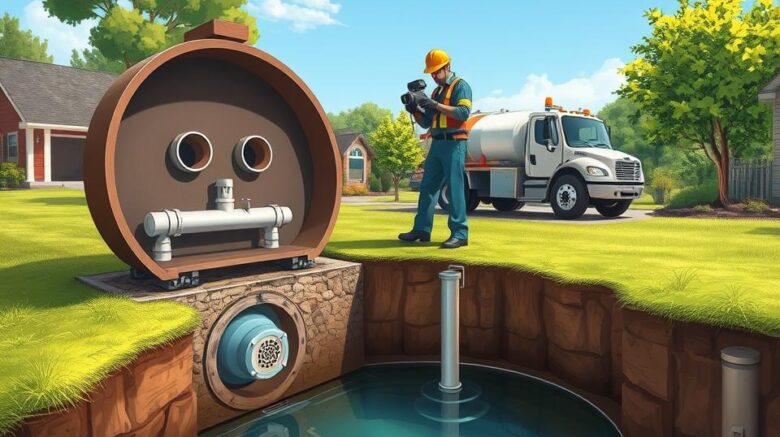Septic Tank Pump Swap: Your Guide
Have you ever thought about the fallout of a Septic Tank Pump malfunction? For many, it’s a circumstance that causes serious distress and sudden expenses. Noticing the requirement for prompt replacement is essential in keeping a smooth and hygienic Septic system. By scheduling regular reviews, including prompt repair needs, you prolong your system’s life while skipping costly emergencies. Companies like All in Sanitation fulfil a key part in keeping your Septic tank working efficiently. This guide delivers a concise insight of Septic Tank Pump replacement, detailing alert signals and upkeep suggestions for septic pumping companies near me.
Essential Insights
- Understanding the job of a Septic Tank Pump is crucial for homeowners.
- Early Septic Tank Pump replacement can lower overall spending.
- Regular service and cleaning are important to increasing the lifespan of your Septic system.
- Skilled support can competently oversee Septic system Pump repair and maintenance.
- Spotting initial symptoms of Pump failure can avoid expensive fixes.
Knowing Your Septic System
A Septic system is essential for homes without access to municipal sewers. It treats and disposes of household wastewater responsibly. The Septic tank is key to this system’s process, playing a vital role in the process.
The Septic tank receives sewage, dividing solids from floatables. This split is vital for successful wastewater treatment. The treated water then moves to the drain field, where it gets further cleansing by the soil, safeguarding groundwater.
Understanding how your Septic system functions can prolong its life and efficiency. Routine maintenance is critical for the Septic tank and the system’s overall well-being. Homeowners must learn about their system’s details to reduce ecological impact and avoid high-cost work.
Septic Tank Explained
A Septic tank is a subsurface, watertight container central to household waste management systems. It’s necessary to grasp the Septic tank’s main purpose: it processes sewage waste storage by conditioning it. This setup functions by distinguishing solids from liquids, promoting basic wastewater treatment and sanitation.
Its operation relies on naturally occurring microorganisms that decompose waste. In locales without centralized sewage treatment, Septic tanks are indispensable. They store sewage long enough for solids to drop, forming sludge. Meanwhile, liquid effluent rises to the top, setting the stage for filtration in the drainage field.
Keeping a Septic tank in sound shape is vital for its efficiency and longevity. Regular maintenance is central to avoiding problems like backups and overflows. These incidents can lead to expensive repairs and pose risks to the environment. In essence, Septic tanks hold a key place in upholding sanitation and safety, especially in rural areas.

How to Tell a Pump Needs Replacing
Homeowners should be alert of signs that their Septic tank may need a new Pump. A clear sign is experiencing foul odors by drains or in the garden, indicating a system failure. Experiencing repeated or severe sewage backups in your home demands prompt action to head off worse issues.
Seeing slow draining drains indicates a potential problem. Sinks, showers, or toilets that empty slowly might signal a Pump failure or a clog that needs an expert’s evaluation. Additionally, patches of unusually lush vegetation in your yard could suggest trouble; this implies waste leakage, creating overflow concerns.
To sidestep large, pricey repairs, homeowners should handle these indications swiftly. Carrying out periodic reviews and maintenance is essential for the Septic system’s top function.
| Signs | Description |
|---|---|
| Foul Odors | Unpleasant smells around drains or yard indicating system failure. |
| Sewage Backup | Frequent backups in sinks or toilets signaling potential Pump issues. |
| Slow Draining Drains | Fixtures draining slowly can mean blockages or Pump malfunction. |
| Lush Vegetation | Areas of overgrowth near the tank indicating possible overflow. |
How Often Should You Replace Your Septic Pump?
Appreciating the interval for replacing your Septic Pump is vital for a smooth-running Septic system. It’s wise to have your system checked every three years. A trained technician during these inspections provides details into how well your system runs.
Usually, service of the Septic tank becomes essential every five years. However, households with extensive use or a larger number of occupants might need service more often. Diligent service of your Septic system thwarts pricey work and extends its lifespan. Technicians in Septic services can design a maintenance plan that matches your needs and the particulars of your system.
Staying ahead with Septic Pump replacements secures your system’s smooth running and guards your home investment. Periodic evaluations and service sidestep unexpected outlays. They maintain seamless system operation.
Cost of Septic Tank Pump Replacement
The Septic Pump replacement cost fluctuates, affected by many aspects. Homeowners should expect spending between $500 to $1,300 for a new Pump. This price range covers differences in the type of Pump and material needs. It’s important to factor in the Pump and Septic tank servicing costs for the setup and mandatory inspections.
Costs can also climb due to problems within the Septic system or local wage levels. Necessary repairs, caused by wear or harm, could boost the total outlay. In evaluating financial estimates for Septic services, add charges for consistent maintenance, inspections, and any unexpected crises since these factors greatly help with maintaining your system’s longevity.
Setting aside money for consistent Septic service minimizes the impact of surprise expenses. Early budgeting assists residents in covering expenses related to the Pump’s replacement and system upkeep.
Pump Replacement Procedure
The Septic Tank Pump replacement kicks off with a comprehensive inspection of the system. This first check detects any additional issues aside from the Pump itself. The faulty Pump is then taken out properly and effectively.
Installing the new Pump involves precise attention to connection security, guaranteeing no leaks. Qualified technicians confirm the installation is done correctly, reducing future issues.
The concluding phase is a complete wrap-up review. It ensures optimal performance, offering homeowners security. With qualified aid, the process is straightforward, with little disturbance.
Septic Tank Pump Installation Best Practices
When handling Septic Pump installation, it’s important to stick to best practices. Engaging skilled professionals secures compliance with local regulations. They competently oversee the installation complexities, preventing errors common in inexperienced setups.
Following stringent Septic service standards is important for harmonious performance. Opting for correct components and reliable materials prolongs the Pump’s life and enhances the Septic system’s efficiency. This careful focus elevates maintenance and overall performance longevity.
- Select a well-reviewed service provider who focuses in Septic systems.
- Ensure that all necessary permits and inspections are in place before work begins.
- Opt for Pumps that fit the specific requirements of your Septic system.
- Schedule a pre-installation inspection to evaluate site conditions.
- Pay attention to the layout and flow of the Septic system during installation.
Following these guidelines ensures a seamless setup. It also provides a reliable system for efficient waste handling.
Upkeep Tips
Avoiding expensive issues with your Septic system begins with regular maintenance. By observing basic guidelines, homeowners can maintain their Septic systems’ efficiency. Scheduling periodic reviews is a smart move. It spots and resolve problems before they become major.
It’s also crucial to not allow flushing dangerous items down the drain. Fat, chemicals, and items that don’t break down can injure your system. Decreasing water use during heavy-demand hours can also improve system handling.
Scheduling expert services with entities like All in Sanitation is crucial for Septic health. Being aware of what you ought and ought not do with your Septic tank can materially boost its lifespan and secure your household environment.
Understanding Cleaning Services
Routine Septic tank cleaning is crucial for your system’s ongoing function and efficiency. The process entails sludge removal, examining for faults, and verifying everything functions correctly. These steps are essential to support reliable function and prevent costly repairs.
A detailed Septic maintenance plan should contain periodic assessments and cleanings that match your specific household requirements. Homeowners must appreciate the importance of timely maintenance to avoid problems like backups. Using professionals guarantees the cleaning is thorough, fostering a safe household.
| Service Type | Frequency | Benefits |
|---|---|---|
| Pumping | Every 3-5 years | Avoids system failure and backups |
| Inspection | Annually | Detects potential issues early |
| Maintenance | As needed | Extends the lifespan of the system |
Committing to periodic Septic tank cleaning reduces expenses and prolongs your system’s life. It supports uninterrupted waste treatment. Taking action now ensures your Septic system’s efficiency for the future.
Selecting the Right Service
Finding a reliable Septic service provider is vital when replacing a Septic Tank Pump. Start by confirming their certifications and licenses. Such credentials validate the company’s compliance with industry norms, critical for a successful replacement process.
Reviewing customer reviews is also a key step. Past feedback shows service quality, supporting the filtering process. Select companies with a steady track record of high standards and customer support.
Listen to recommendations from your social circle too. Insights from friends and neighbors can point to top-notch Septic services in your vicinity. Always ask for detailed stories of their positive experiences with these services.
Finally, review the range of services and cost from various firms. A thorough analysis provides exceptional service and improves the value of your expenditure. Adhering to these guidelines guarantees your Septic system receives the top-notch care it merits.
Deciding Between DIY and Pros
Homeowners often find themselves pondering whether to tackle Septic issues independently or bring in professionals. DIY Septic maintenance is attractive for small fixes and upkeep. For example, observing tank volume or flushing drainage lines can be done on your own.
In contrast, recognizing when to hire Septic professionals is vital for significant failures. Complicated repairs, replacing systems, or serious blockages demand specific equipment and skills. Without the correct equipment, attempts to resolve these problems can lead to environmental harm and significant harm.
Determining between DIY and professional help requires evaluating the job’s complexity. Presented below are examples illustrating when DIY is appropriate and when professional Septic services are advised:
| Situation | DIY Feasibility | Need for Professional Help |
|---|---|---|
| Routine maintenance (e.g., tank level checks) | Yes | No |
| Minor clogs in drain fields | Yes | No |
| Major Septic Tank Pump failure | No | Yes |
| Complex sewage backflow issues | No | Yes |
| Regular system inspections | Maybe DIY | Yes for thorough checks |
Choosing wisely on these matters ensures safety and efficiency. Selecting well both protects and preserves the Septic system but also avoids sudden charges.
As a Final Point
Knowing the workings of your Septic system is important for its sound handling and your home’s well-being. Identifying early signs of issues heads off high repair bills and maintains the system’s integrity. This proactive approach helps the environment and raises your property value.
To keep your Septic system in prime condition, make sure of maintenance. This means routine checks and scheduled professional Pumping. This small outlay keeps your home’s safety and your health. Your Septic system operates smoothly with adequate service.
Our team at All in Sanitation is focused on providing premium Septic care. We deliver the knowledge required to guarantee your system operating efficiently, safeguarding your home investment over time. With our dedication to reliable support and steadfastness, we’re prepared for your Septic maintenance needs.
